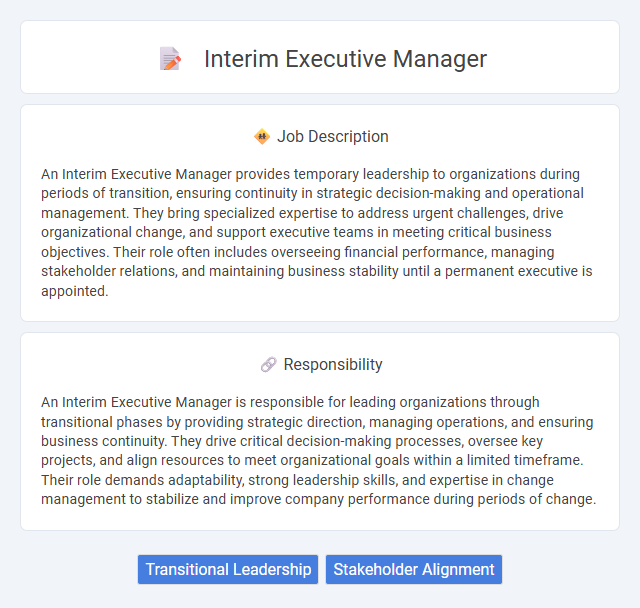
An Interim Executive Manager provides temporary leadership to organizations during periods of transition, ensuring continuity in strategic decision-making and operational management. They bring specialized expertise to address urgent challenges, drive organizational change, and support executive teams in meeting critical business objectives. Their role often includes overseeing financial performance, managing stakeholder relations, and maintaining business stability until a permanent executive is appointed.
Individuals with strong adaptability and resilience are likely well-suited for an Interim Executive Manager role, given the fast-paced and often high-pressure environment. Those who thrive in situations requiring quick decision-making and excellent leadership skills may find this position aligns with their capabilities. Candidates who prefer stability and long-term consistency might find the temporary and transitional nature of the role challenging.
Qualification
An Interim Executive Manager must possess extensive leadership experience and proven expertise in strategic decision-making, financial oversight, and operational management. Strong qualifications include a background in change management, excellent communication skills, and the ability to drive organizational growth during transitional periods. Relevant certifications such as PMP or an MBA enhance credibility and effectiveness in delivering results swiftly.
Responsibility
An Interim Executive Manager is responsible for leading organizations through transitional phases by providing strategic direction, managing operations, and ensuring business continuity. They drive critical decision-making processes, oversee key projects, and align resources to meet organizational goals within a limited timeframe. Their role demands adaptability, strong leadership skills, and expertise in change management to stabilize and improve company performance during periods of change.
Benefit
Hiring an Interim Executive Manager can likely provide a company with immediate leadership expertise during transitional phases or crises, minimizing operational disruptions while a permanent hire is sought. This role probably delivers strategic direction and decision-making agility, improving business continuity and adaptability. Organizations may benefit from cost-effective, short-term high-level management without long-term commitment risks.
Challenge
Taking on an Interim Executive Manager role likely involves navigating complex organizational challenges, such as stabilizing leadership during transitional periods and driving critical strategic initiatives under tight deadlines. The position probably demands quick decision-making and adaptability to unpredictable business environments while maintaining team morale. Balancing short-term pressures with long-term goals could be one of the most significant professional tests in this role.
Career Advancement
Interim Executive Manager roles provide strategic leadership opportunities that enhance executive experience across diverse industries. These positions facilitate rapid skill development in decision-making, change management, and operational oversight, accelerating career advancement. Executives gain a competitive edge by demonstrating adaptability and delivering impactful results in high-pressure environments.
Key Terms
Transitional Leadership
Interim Executive Managers provide critical transitional leadership by steering organizations through periods of change, such as mergers, restructuring, or leadership gaps. They quickly assess operational challenges, implement strategic initiatives, and ensure continuity to maintain business stability. Their expertise in crisis management and adaptive decision-making drives sustained performance during uncertain times.
Stakeholder Alignment
Interim Executive Managers specialize in driving stakeholder alignment by facilitating transparent communication and ensuring all parties have a shared understanding of organizational goals. Their expertise lies in navigating complex stakeholder networks to balance diverse interests, fostering collaboration and trust across departments. This strategic alignment accelerates decision-making processes and propels successful project outcomes.
 kuljobs.com
kuljobs.com